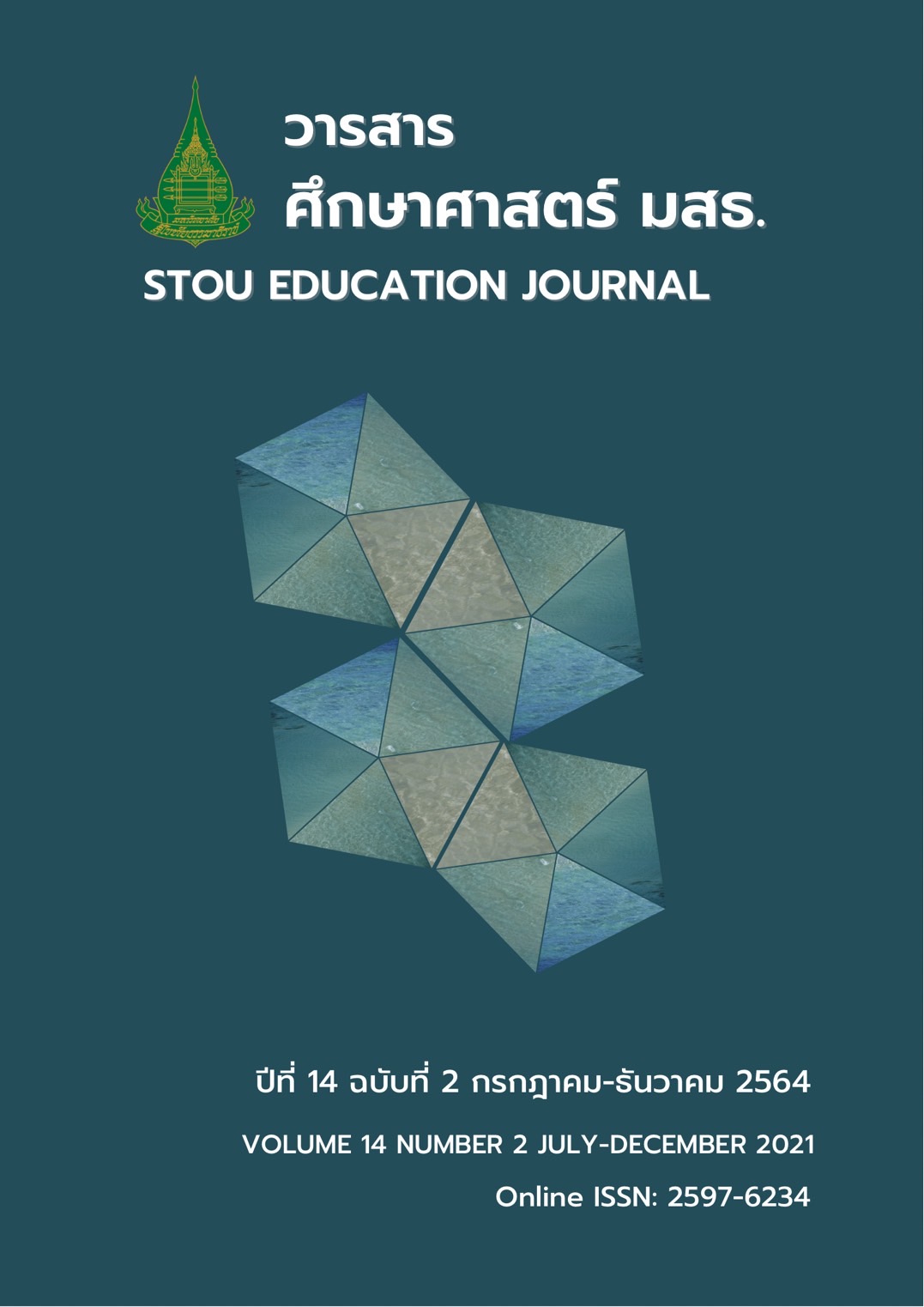การประเมินคุณภาพภายนอกของสถานศึกษา: จากแนวปฏิบัติที่ดีของ ประเทศกลุ่มเป้าหมายสู่การปฏิบัติที่มีคุณภาพสูงขึ้น
Main Article Content
บทคัดย่อ
การวิจัยนี้มีวัตถุประสงค์เพื่อ 1) เปรียบเทียบแนวปฏิบัติตามมิติที่เกี่ยวข้องกับการประเมินคุณภาพภายนอกสถานศึกษาของประเทศกลุ่มเป้าหมาย และ 2) เสนอแนวทางการพัฒนาการประเมินคุณภาพภายนอกสถานศึกษาสู่การปฏิบัติที่มีคุณภาพสูงขึ้น ดำเนินการวิจัย ดังนี้ ระยะที่ 1 ใช้วิธีวิจัยเชิงคุณภาพแบบพหุกรณีศึกษา โดยศึกษาเอกสารเกี่ยวกับระบบประเมินคุณภาพภายนอกสถานศึกษาของประเทศกลุ่มเป้าหมาย ได้แก่ เกาหลีใต้ นิวซีแลนด์ เนเธอร์แลนด์ และมาเลเซีย ได้มาโดยการคัดเลือกแบบเจาะจงจากการเป็นประเทศที่มีระบบการศึกษาและประเมินคุณภาพภายนอกใกล้เคียงกับประเทศไทย และระยะที่ 2 ใช้การสนทนากลุ่มผู้ทรงคุณวุฒิ 9 คน โดยเลือกแบบเจาะจงตามคุณสมบัติด้านประสบการณ์ที่เกี่ยวข้องกับการประเมินคุณภาพภายนอกสถานศึกษา ผลการวิจัยมี ดังนี้ 1) ผลการเปรียบเทียบแนวปฏิบัติตามมิติที่เกี่ยวข้องกับการประเมินคุณภาพภายนอกสถานศึกษา พบว่า การปฏิบัติของประเทศกลุ่มเป้าหมายมีทั้งที่สอดคล้องกันและแตกต่าง และมีบางประเด็นที่เหมาะสมและเป็นไปได้ที่จะใช้เป็นแนวทางการพัฒนาคุณภาพของการประเมินคุณภาพภายนอกสถานศึกษาในประเทศไทย 2) แนวทางการพัฒนาคุณภาพการประเมินภายนอก พบว่า (1) ต้องกำหนดนโยบายและแนวปฏิบัติตั้งแต่ระดับกระทรวง (2) กระบวนการประเมินคุณภาพภายนอกควรมี 4 ขั้น ได้แก่ ขั้นเตรียมการประเมิน ขั้นประเมินในพื้นที่ ขั้นติดตามหลังการประเมินที่มีการปฏิบัติแบบพื้นฐาน และแบบปรับเหมาะโดยยึดตามผลการประเมินในพื้นที่ และขั้นสะท้อนผลการปฏิบัติงานของ สมศ. (3) ควรสร้างสมรรถนะการประเมินคุณภาพภายนอกและการใช้ผลการประเมิน และ (4) ควรมีการปฏิบัติที่สืบเนื่องจากการนำผลการประเมินไปใช้ตั้งแต่ระดับกระทรวง
Article Details
เอกสารอ้างอิง
กิตตินันท์ ชุมวัน ศิริ ถีอาสนา และฐิตารีย์ วิลัยเลิศ (2558). แนวทางการดำเนินงานตามระบบประกันคุณภาพภายใน สถานศึกษาขั้นพื้นฐาน, วารสารศึกษาศาสตร์, มหาวิทยาลัยขอนแก่น, 9(4), 1-8.
รัตนะ บัวสนธิ์. (ม.ป.ป.). การประเมินผลสถานศึกษาและการใช้ผลการประเมินเพื่อพัฒนาคุณภาพสถานศึกษา. สืบค้นจาก https://fliphtml5.com/ggpzt/mrlu/basic
วารุณี ลัภนโชคดี. (2560). ปัจจัยที่ส่งผลและพัฒนาการของระดับคุณภาพของสถานศึกษาขั้นพื้นฐานจากผลการประเมินคุณภาพภายนอกทั้งสามรอบ ของสำนักงานรับรองมาตรฐานและประเมินคุณภาพการศึกษา (องค์การมหาชน). (รายงานการวิจัย). กรุงเทพมหานคร : สำนักงานรับรองมาตรฐานและประเมินคุณภาพการศึกษา (องค์การมหาชน).
ศิริเดช สุชีวะ, ใจทิพย์ ณ สงขลา และ ทิพวัลย์ ปัญจมะวัต. (2561). การวิจัยเพื่อพัฒนารูปแบบและวิธีการพัฒนา สมรรถนะผู้ประเมินภายนอก. วารสารวิธีวิทยาการวิจัยทางการศึกษา, 31(3), 258-279.
ศูนย์สำรวจความคิดเห็น “นิด้าโพล”. (2561) . รายงานผลการสำรวจความพึงพอใจต่อแนวทางการประเมินคุณภาพภายนอกรอบสี่ของสำนักงานรับรองมาตรฐานและประเมินคุณภาพการศึกษา (องค์การมหาชน)
ประจำปีงบประมาณ 2561. สืบค้นจาก http://www.onesqa.or.th/upload/download/201903121824365.pdf.
Bronfenbrenner, U. (1990). Discovering what families do. In Rebuilding the Nest: A New Commitment to American Family, Family Service America. Retrieved from https://www.researchgate.net/publication/ 257526983_CULTURAL_SPACE_AND_SELF_IDENTITY_DEVELOPMENT_AMONG_DEAF_YOUTH/figures?lo=1
Cheng, Y. C. (1996). A school-based management mechanism for school effectiveness and development.
School Effectiveness and School Development, 17(1), 35-61.
Ehren, M. C. M., & Visscher, A. J. (2008). Towards a theory on the impact of school inspections. British Journal of Educational Studies, 54(1), 51–72.
Lindberg, E. (2013). School-based management with or without instructional leadership: experiment Sweden Journal of Education and Learning, 2(3), 39-50.
OECD. (2013). School Evaluation: From compliancy to quality. Retrieved from https://www.oecd- ilibrary.org/ docserver/9789264190658-10-en.pdf.
Ofsted (2012).Qualifications, experience and standard required of additional inspectors undertaking inspections on behalf of Her Majesty’s Chief Inspector of Education, Children’s Services and Skills and House of Commons Education Committee (2011), In The role and performance of Ofsted. London: The Stationery Office Limited.
Schagen, S., & Wylie, C. (2009). School resources, culture and connections. Wellington: NZCER.
Scheerens.J., Ehren,M., Sleegers,P.,de Leeuw,R. (2012). OECD Review on Evaluation and Evaluation Frameworks for Improving school Outcomes:Country Background Report for the Netherlands. University of Twente. Retrieved from www.oecd.org/edu/evaluationpolicy.
Scheerens,J., Ehren, M., Sleegers, P. & de Leeuw, R. (2012). OECD Review on evaluation and assessment frameworks for improving school outcomes: Country background report for the Netherlands. University of Twente, the Netherlands. Retrieved from https://www.oecd.org/education/school/NLD_CBR_Evaluation_and_Assessment.pdf
Schildkamp, K. K., Rekers-Mombarg, T. L. & Harms. J. (2012). Student group differences in examination results and utilization for policy and school development. School Effectiveness and School Improvement, 23(2), 229-255.
Van Bruggen, J. (2010). Inspectorates of Education in Europe; Some comparative remarks about their tasks and work. Brussels: SICI.


